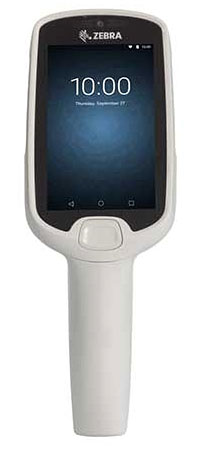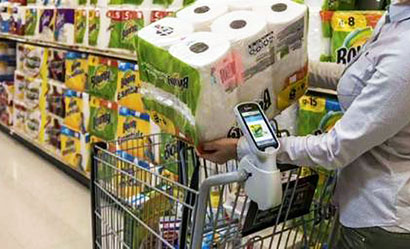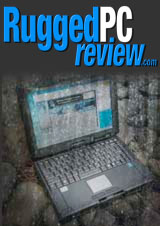|
Zebra PS20 Personal Shopper
Smart, optimized, localized handhelds enhance the shopping experience in brick & mortar stores
(by Conrad Blickenstorfer)
Share on:




You're in a store and can't find something, or you want to do a price check, see if there's a coupon, talk to a manager, have a question, pick up an order, check the running total of your items, or whatever.  What do you do? Try to find someone to help you? Whip out your smartphone and see if you have the store app that might help? Zebra thinks there is a better way. Their PS20 Personal Shopper. What do you do? Try to find someone to help you? Whip out your smartphone and see if you have the store app that might help? Zebra thinks there is a better way. Their PS20 Personal Shopper.
What is the PS20? It's a 10-ounce little handheld with a grip. Zebra calls it a "personal shopping solution" that makes shopping easier and more efficient for customers, and helps store associates and managers improve efficiency.
Shoppers can pick up a device when they enter the store, then use it as their own personal assistant in that store. They can download their shopping list, quickly find items, get info, ask question via voice, skip checkout, and so on.
It's easier than an app because the PS20 is totally customized for the store. And since it's Android, most people are already familiar with how it works.
Interestingly, Zebra's personal shopper concept actually predates the smartphone as we know it. The PS20 is the 6th generation of an idea that goes back to the dawn of Pocket PCs and PDAs. It originally came out of Symbol's ever innovative design shop, initially as a design study and proof of concept, and then as a real product with enough application to hang around and be improved with each successive generation. Today, personal shoppers are used in thousands of stores.

When the personal shopper was first conceived, not even its creators could have predicted the massive global acceptance of smart device technology into virtually every aspect of our lives. Yet, on the outside the personal shopper itself has changed remarkably little. They pretty much got it right from the start.
The screen is larger now (though at 4 inches diagonally it's still quite small), and the electronics far more powerful with a punchy 2.2GHz Snapdragon 660 octa-core chip at the center. There's capacitive multi-touch, the latest version of Android, a powerful battery, and integrated industrial-grade scanning that's far better and far quicker than anything available in a smartphone.
What all this means is that customers shopping with a Zebra PS20 essentially have a modern smartphone with custom software for a particular store and location that provides a significantly enhanced shopping experience. Unlike a shopper's own smartphone, the PS20 is fully customized for just this store, making it far easier to use than any smartphone, providing customers with a real value-added, one that saves time and money.
PS20 -- not just for customers
On the retailer's side, making PS20s available in stores can increase customer satisfaction, lead to extra sales, and provide a competitive edge. Zebra offers comprehensive device management solutions, numerous "Mobility DNA" apps to optimize connectivity, batteries, etc., as well as OS upgrade support and security updates. And note that the PS20 can be used not just on the customer side but also on the workforce side (product picking, returns, put-aways, shelf replenishment, etc.).
Tough enough
By necessity, Zebra also made the PS20 remarkably tough and rugged. It can survive multiple 4-foot drops, a thousand half-meter tumbles, and take the general day-to-day abuse in a retail environment. Its very wide operating temperature range means it can be used almost anywhere. And Zebra offers a wide variety of accessories for the PS20 that includes various types of cradles and cradle accessories, various connection methods, various charging methods, as well as tools, deployment kits and mounting methods.
The potential of personal shopping
While the world has changed dramatically in this personal technology and social media age, the potential of a personal shopper device remains intriguing, more so than ever. Yes, many customers will simply use their own smartphone. But many are now more likely to use, understand and appreciate a store-dedicated and store-optimized shopping tool that can save them time and money.
It's not for everyone and everywhere and there are challenges (upfront costs, security, cleaning, logistics, etc.), but the inherent application of personal shopping systems is limited only by the imagination of innovative store managers and good programmers. -- Conrad H. Blickenstorfer, Sept. 2018
|



